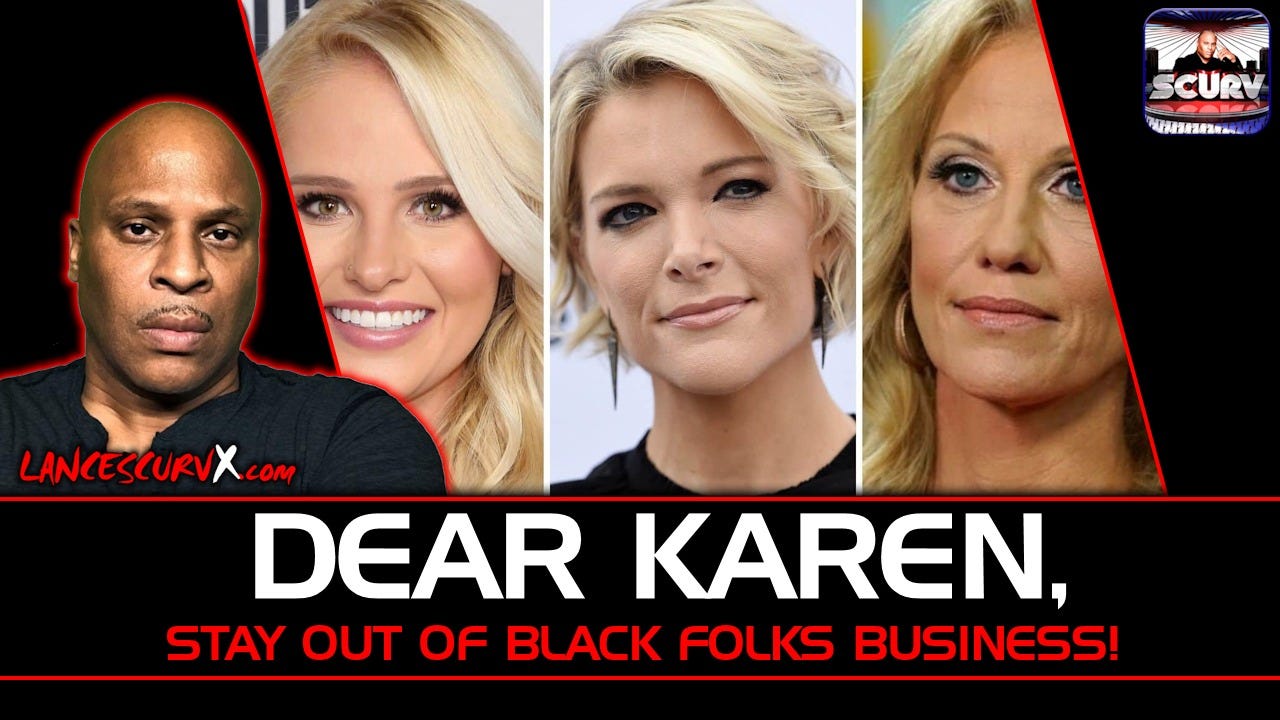There is a strange pattern that keeps showing up whenever Black people try to heal, rebuild, or have real conversations about our families and our communities. The moment we sit down to speak honestly about our struggles, our growth, and our responsibility to each other, here comes a certain type of white woman stepping in, uninvited, telling us what we should think, how we should feel, and how we should “fix” ourselves. And it’s always in the name of love, peace, or unity—until you look deeper and see the arrogance behind it.
Black people understand this type all too well. This is the same woman who will say, “I’m here to support everyone,” but the minute we focus on healing Black women, building Black men, or repairing Black families, suddenly she feels uncomfortable. Her need to control the tone of the room becomes stronger than her supposed desire for unity. She can’t let the spotlight shift away from herself—not even for a moment.
This is the psychology of the Karen. She walks into a Black space, not to listen, not to respect the topic, but to redirect the conversation to her comfort level. She can’t stand the idea that Black people might talk to each other without her being the center, the judge, the teacher, or the savior. She acts like she knows our experience better than we do, even though she hasn’t lived one day in our skin.
The moment we speak about elevating Black women or encouraging Black men to step up, she shows her true colors. She becomes irritated, defensive, and “concerned.” That concern is nothing but a mask for control. She doesn’t want healing; she wants dominance. She doesn’t want unity; she wants oversight. She doesn’t want equality; she wants to supervise.
This discussion is a message to her. A direct, unapologetic message: Karen, stay out of Black folks’ business. We didn’t ask for your leadership, your therapy, or your so-called guidance. Sometimes people need to sit down, listen, and let others build. And that’s something many Karens simply don’t know how to do.
Let’s be real about it: Karens have a long history of feeling entitled to walk into spaces that don’t belong to them and act as if they are the authority. One reason they get annoyed when Black people talk about our issues is because it bothers them to see us take control of our own narrative. They are used to being the voice in every room. When we start speaking for ourselves, it threatens their sense of superiority, and that is why they often jump in with “advice” or emotional guilt trips disguised as concern.
Another thing that fuels the psychology of the Karen is the belief that she knows more about Black life than Black people do. She reads a few articles, watches a documentary, takes a college course, and suddenly she feels educated enough to correct us on our own struggle. The arrogance is unbelievable, but it comes from a society that has always put her on a pedestal and taught her that her opinion carries more weight than ours.
Karens also feel disrupted when Black unity is the topic. They are completely comfortable watching Black men and women tear each other apart. They enjoy the dysfunction, and many see it as entertainment. But when the conversation shifts toward love, accountability, rebuilding, and family healing, their mood changes immediately. Healing removes their sense of control. Unity takes away the chaos they feed on. Strength in our community means we are no longer dependent on their validation, and that scares them.
A fourth thing that gets under a Karen’s skin is the idea that Black people might be speaking privately—even in a public space like YouTube. When she enters a livestream that is centered on Black issues, she expects to sit in the queen’s seat, judging, steering, and directing the tone. If she cannot control the direction of the dialogue, she feels disrespected, and her passive-aggressive comments start flowing. This is emotional colonization, the modern form of policing Black voices.
Another psychological factor is her belief that she is more compassionate than we are. She will say things like, “We should love everyone” or “This isn’t just a Black issue,” and try to shame us for focusing on our own. But this fake compassion disappears the moment she thinks we aren’t following her script. She wants to appear as the moral teacher while silencing the people actually living the experience. Her compassion is selective, because if she truly cared, she would allow us the space to heal ourselves without interfering.
A sixth point is that Karens hate accountability when it points in their direction. They will act like their feelings matter more than our reality. So when we discuss trauma, racism, disrespect, or cultural interference, they get offended and make themselves the victim. They become emotional to shut down the conversation and redirect the attention back to themselves. Their “offense” is a tool of control.
A seventh reason they get annoyed is because they believe their presence automatically elevates the conversation. They’ll enter the chat as if their validation is a blessing to us. But when we continue the discussion without bowing to their opinions, they feel rejected. That’s when the rude comments start, because a Karen needs power to feel comfortable.
Another psychological trait is that Karens are shocked when Black people set boundaries. Telling her, “This conversation is for us,” feels like an attack to her. That reveals the entitlement she carries. She believes she has the right to insert herself into every cultural moment, every emotional discussion, every healing session. She sees exclusion—even temporary and polite—as disrespect.
A ninth point is identity confusion. Many Karens think they understand Black life because they know a few Black people, dated a Black man, or watched some TV shows. That limited exposure gives them a false sense of expertise. They confuse proximity with experience, and that leads to condescending attitudes and shallow “advice.”
The tenth and final issue is that some Karens simply cannot accept the idea of Black independence. When we say, “We’re building something for ourselves,” they hear, “We don’t need you.” That shakes their entire worldview. They thrive in spaces where they can manage, guide, or supervise. But a self-sufficient Black voice threatens their illusion of superiority, so they disrupt the conversation to regain control.
MY FINAL THOUGHTS…
At the end of the day, this is not about hate or exclusion. This is about respecting boundaries. When a Black discussion is happening, especially a discussion aimed at healing our people, we deserve the space to talk openly without someone barging in to dictate how we should feel. It is not disrespectful to focus on ourselves. It is necessary for survival.
Black healing requires honest conversation, and sometimes that conversation is not meant for outside control. If someone truly respects us, they will listen instead of trying to take over. They will sit quietly and allow us to work through our issues without trying to manage the process. That is what real support looks like. That is what real love looks like.
Karens need to understand that leadership does not belong to them in every room they enter. They are not the center of every conversation, and they are not the authority on our lives. If they want to learn, they can sit back. If they want to listen, they can stay. But when the goal is control or interference, they need to step aside.
Our healing is sacred. We take it seriously. We are tired of outsiders using our pain as entertainment and then trying to correct us when we decide to fix what is broken. We are tired of being policed in our own spaces. Enough is enough.
So the message stands loud and clear: Dear Karen, stay out of Black folks’ business. Not because you aren’t welcome to watch, but because you are not welcome to control. Let us speak. Let us heal. Let us build. And learn to respect the boundary you were never taught to see.













